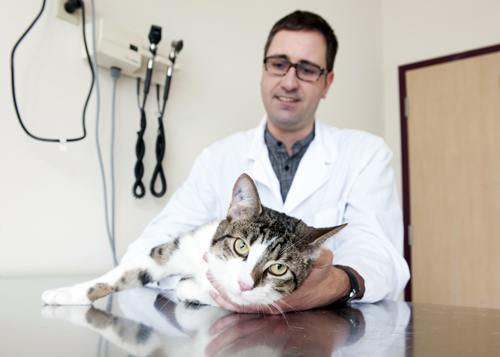
As a high school student in Belgium, Vincent Defalque hadn’t even considered veterinary medicine. He wanted to study oceanography and marine mammals, and attended an open house at the University of Liège in Belgium to learn more about the program. Coincidentally, the veterinary medicine department had an open house on at the same time and Defalque decided to check it out. He told the veterinary medicine representatives about his interests in marine mammals, and they persuaded him that a degree in veterinary medicine would be more useful.
Defalque still thought he’d use that degree to study animals living in the ocean, until a friend’s dog developed severe allergies. As Defalque – still a student – observed the testing and treatment process, he realized how fascinating it was and decided to specialize in veterinary dermatology.
Dermatologists who work with humans often provide cosmetic surgery and anti-aging treatments as well as treat skin cancers and diseases such as lupus. A veterinary dermatologist, though, deals most often with allergies.
“Most of our patients are itchy dogs and cats,” says Defalque. “I also see a lot of animals with ear diseases. True skin diseases like lupus are very rare in animals.” Dermatology is one of the less-common specialties: there are fewer than 600 veterinary dermatologists in the world and only about 300 in North America.
Its rarity as a specialty is rather surprising. Defalque points out that many of the most common reasons for visits to the vet are related to dermatology. In a list compiled by VPI Pet Insurance, the top three claims made for dog visits to the vet were for ear infections, skin allergies and “hot spots” (pyoderma); in cats, skin allergies and ear infections were two of the top 10. All of these fit under the dermatology umbrella. Defalque also cares for horses and exotic pets with skin problems.
How do you know if your pet has allergies? “Pets having an allergic reaction will spend a lot of time chewing, biting or licking their paws, or rubbing their faces or they have ear infections,” says Defalque. Most of these allergic reactions are caused by the environment, he explains, and the main offender is dust mites. Other causes are mould, pollens and reactions to insect bites. Pet owners often suspect food allergies but Defalque says these are actually less frequently the cause of the animal’s problems. However, adverse skin reactions to chicken, beef, lamb, fish, cow’s milk and grains such as corn and wheat have been seen.
Allergies often have genetic roots. Defalque says that, among dogs, they are most common in Labrador retrievers, golden retrievers, French bulldogs, shih tzus, pugs and West Highland white terriers.
There’s no cure for allergies, so treatment is usually ongoing. “We become lifelong friends,” says Defalque. At OVC, he’ll see patients referred to the hospital by veterinarians.
Since these conditions are often seen by general-practice veterinarians, Defalque sees his work with OVC students as very valuable. “We are a teaching hospital, so the students will see patients with me and learn through those experiences. Dermatology is an important specialty to be exposed to.”
Defalque’s studies and experience span two continents. After completing his veterinary degree at the University of Liège, he did a small-animal internship at the National Veterinary School of Lyon in France. From there, he travelled to Michigan State University for a dermatology residency and then to the University of Pennsylvania, where he worked in the dermatology section of the hospital. Defalque’s next move was to British Columbia, where he opened a private practice in Vancouver and Victoria.
He visited the University of Guelph while he was studying in Michigan and liked what he saw, so he was interested in applying here when the opportunity came. “I did enjoy private practice, but here at OVC there is more variety. I will be doing mostly clinical work, but I also enjoy teaching and working with students and hope to be involved in research in the future,” he says.
When that time comes, he’s quite interested in studying the problem of methicillin-resistant Staphylococcus pseudintermedius (MRSP), a bacterium that can cause serious infections in the skin and soft tissues of dogs and cats and that is resistant to most common antibiotics, much like methicillin-resistant Staphylococcus aureus (MRSA) seen in humans. While not a high risk for people, MRSP seems to be a growing problem for pets around the world.